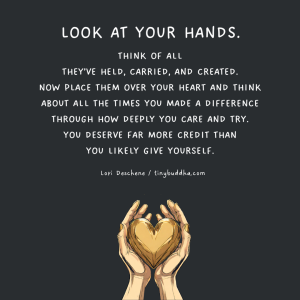
“Your task is not to seek love, but merely to seek and find all the barriers within yourself that you have built against it.” ~Rumi
Do you want to let go and live life fully?
If you feel that you are missing out on fulfillment and happiness, but cannot put your finger on why, perhaps there is something deeper going on.
Believe it or not, anyone can develop an unconscious habit of self-deprivation. Usually this habit begins in childhood.
Here’s how mine developed.
When I was younger, if anyone approached and tried to attend to my needs, I’d make sure they understood that I was just fine without their help.
Interestingly, I was also accident-prone. I was always managing to take a spill, as if in hot pursuit of another skinned knee or broken bone. Yet, I cannot remember one instance when I welcomed sympathy or caring or intervention from anyone.
I guess thought I was pretty tough. Looking back, I also wonder how much I wanted to prove that I didn’t need other people. I am fine! Now, kindly leave me alone. This was my attitude.
Why? There could be many reasons.
You could call it genetics—just look at the other men in my family. Enough said!
You could say I had a somewhat cold and distant mother. I was proving to her that I didn’t need her anyway.
You could even blame the primal backlash that occurs when we exit the womb. When we make the transition from the oblivious comfort and security of the womb into a world where, by comparison, we feel deprived, controlled, and rejected, we are bound suffer some maladaptive consequences.
We could find lots of things to blame, but the point is, I developed this pattern. And I marched right into adulthood with it firmly in place.
The unintended outcome was that I rarely felt loved (imagine that). It was hard to be close to anyone and I felt disconnected, empty, and alone. I didn’t want to feel this way, but that’s what happens as you refuse to connect when people reach out.
I couldn’t have been more successful if my unconscious mind had an actual goal to keep me in a state of emptiness and deprivation.
The big AHA moment came when I realized I was attached to being emotionally deprived. Attachments are not a conscious choice, but an unwitting set up that lands us in that old, familiar place where we do not get what we want.
Amazingly, over the years we learn to tolerate it, come to expect it, and even prefer the deprivation in some strange, familiar way. It is critical to recognize when this is happening.
Here are nine signs you have developed an attachment to deprivation, unwittingly setting yourself up to feel unfulfilled:
1. You don’t express your needs.
Refusing to express your needs virtually guarantees deprivation. Millions of people allow others to ignore, take advantage, and take them for granted because they will not speak up.
2. You are overly focused on the needs of others.
Focusing solely on the needs of others at the expense of your own is actually a disservice to yourself and others. It typically leads to resentment and emotional martyrdom.
3. You feel guilty when you do something for yourself.
Guilt or “selfish” feelings when you meet your own needs is a sign that you don’t believe you deserve to have them met, as if it were wrong.
4. You can’t take compliments.
Not accepting compliments graciously (inside and out) is a way to deflect them, depriving yourself of the need to be appreciated.
5. You are attracted to emotionally unavailable or self-centered people.
A sure way to not to get your needs met is to attract emotionally unavailable or narcissistic people into your life. When you commit to these kinds of people, you set yourself up for a lifetime of emotional deprivation.
6. You expect disappointment.
Expecting disappointment keeps fulfillment at a distance. Going into situations anticipating disappointment becomes a self-fulfilling prophecy.
7. You don’t know what you want or cannot define your purpose in life.
This is so common! People usually don’t think of it this way, but not knowing what you want or even trying to figure it out is a way to avoid your purpose. Living with a sense of purpose is a huge need that brings meaning and fulfillment.
8. You shy away from intimacy.
When you avoid close relationships or shy away from deeper connections with people, you miss out on this fundamental contribution to happiness and fulfillment.
9. You cannot enjoy the moment.
Letting go and having fun in the here and now is an important way to experience fulfillment and reduce stress. It is a huge need! Staying in your head, remaining preoccupied or self-conscious robs you of the opportunity to enjoy your now.
Each of the above examples leads us straight into deprivation, even though we did not consciously choose to go there. It is important to shine the healing light of awareness on this issue and begin to question whether or not it is appropriate to continue doing this at this point in life.
My self-deprivation tendency, to act too tough to accept help and love, is much softer these days. I’ve been working on it. In the process, I have discovered a whole new world of support—people who are willing to love and be loved, to support and be supported.
This new world has always been available; it was just hidden behind my attachment.
Look for the signs of a deprivation attachment in your life. You may be surprised at what you find!
About Mike Bundrant
Mike Bundrant is co-author of The AHA Solution: An End to Self-Sabotage. To watch a free, 20-minute webinar on psychological attachments and how to end self-sabotage in your life, click here.













 Though I run this site, it is not mine. It's ours. It's not about me. It's about us. Your stories and your wisdom are just as meaningful as mine.
Though I run this site, it is not mine. It's ours. It's not about me. It's about us. Your stories and your wisdom are just as meaningful as mine. 